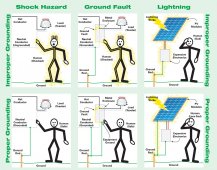Just got off the phone with two different electricians and they both had completely different opinions on what to do. Each thought the other was a donkey.
In planning my system I though that driving an 8' ground rod into the earth and attaching a bare copper wire to the main panel would close the grounding portion of the system plan - which is:
1 electrician said do not earth ground battery powered off grid systems. Earth ground the panels for shock prevention.
The other said earth ground the main panel and ground ac out on the inverter to that panel.
Who's right and why is it neither of them? ?
In planning my system I though that driving an 8' ground rod into the earth and attaching a bare copper wire to the main panel would close the grounding portion of the system plan - which is:
- 12 panels mounted with s5 brackets to a corrugated metal roof that is on a wood frame on top of a shipping container.
- The shipping container is on concrete footings.
- The main panel is on the side of the container in a shed.
- The circuits run inside and along the outside of the container.
1 electrician said do not earth ground battery powered off grid systems. Earth ground the panels for shock prevention.
The other said earth ground the main panel and ground ac out on the inverter to that panel.
Who's right and why is it neither of them? ?



